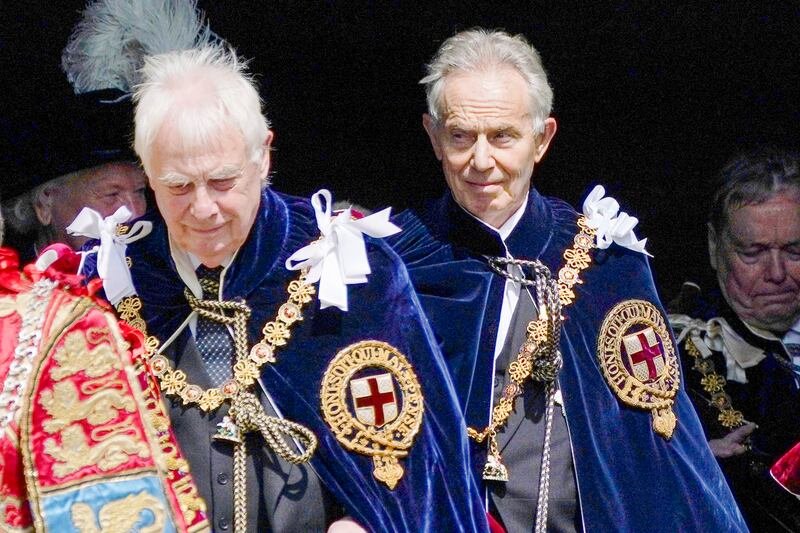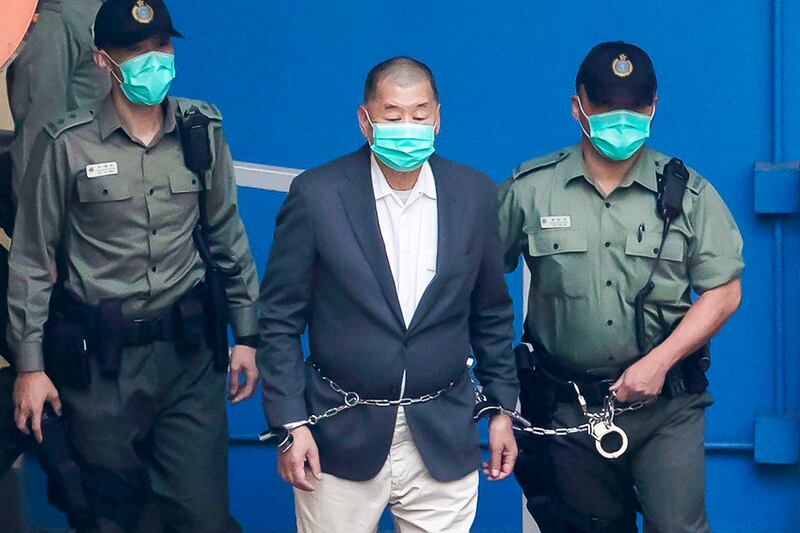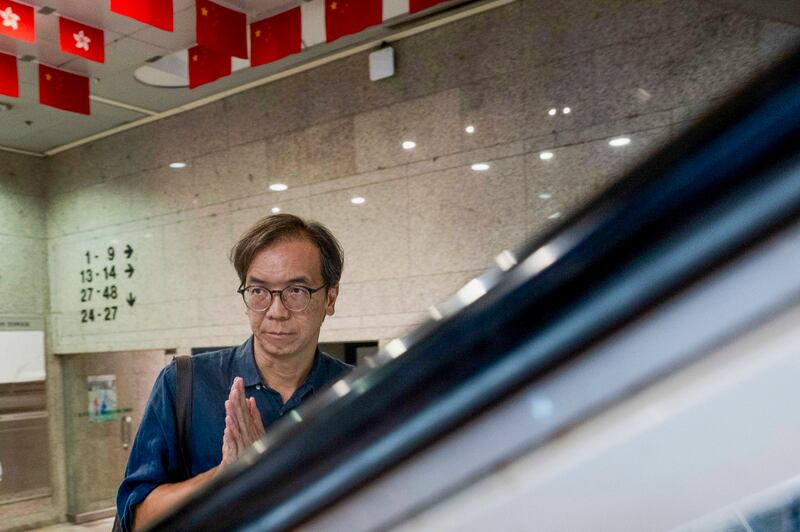This week in London, approximately 200 Hong Kongers and supporters gathered to celebrate the 80th birthday of the last British colonial Governor of Hong Kong, Chris Patten, who urged the city’s beleaguered residents to stay strong in the face of repression.
Patten, who led Hong Kong in the five years leading up to the 1997 handover of the thriving financial and commercial center to Communist Party-run China, both looked back at that momentous time and forward to the tasks facing Hong Kongers.

Before living in Hong Kong in 1992, "I wrote articles about the rule of law, I made speeches about open societies and freedom of speech, about liberal democracy,” he told the gathering at St John’s Church near Waterloo.
“In Hong Kong we saw this done with no actual resources to speak of but its own indomitable Chinese people. So I learned in Hong Kong in practice what I thought I knew about intellectually, what I had read in books, but not actually practiced myself,” Patten added.
Patten’s attempts to build up institutional safeguards for civil liberties and press freedom as the handover from British to Chinese rule drew the wrath of the Chinese Communist Party (CCP), which still vilifies him nearly 30 years after the handover.
Despite that treatment, speaking on behalf of his family, told the crowd in London that “the five years we spent in Hong Kong were the happiest of our lives. It's as simple and straightforward as that.”
Recalling his integrity
Patten, a former UK parliamentarian who was made a life peer in 2005 and served as chancellor of the University of Oxford from 2003 until his retirement this past July, received a plate of his much-loved egg tarts with candles and a card signed by over 100 Hong Kongers from around the world.
Lee Wing-tat, a former member of the Hong Kong Legislative Council and a former chairman of the Democratic Party of Hong Kong, said Patten’s governorship was “not only an act of service, but is rooted in his love for Hong Kong,”
Lee concluded: “Lord Patten, I wonder how much of your feelings for Hong Kong now consist of frustrations, anxieties and certainties?”
Please explore further RFA coverage and commentaries on Hong Kong:
[ Hong Kong finds former editors guilty of sedition in blow to press freedomOpens in new window ]
[ Xi is a ‘dictator’ who broke Hong Kong treaty, ex-governor saysOpens in new window ]
[ EXPLAINED: How much has media freedom deteriorated in Hong Kong since 2020?Opens in new window ]
Representing younger Hong Kongers, artist and activist Catherine Li said that while she was “just a toddler” during his 1990s tenure, “I have come to learn about your governance, which was grounded in integrity and focused on safeguarding the rights and freedoms of the people.”
Li, a member of the steering committee of the UK-Hong Kong Symposium that unites over 60 civil society organisations across Britain, added: “We have always been grateful to have you as our last Governor of Hong Kong, but we are even more appreciative of your ongoing dedication, solidarity and support for Hong Kong long after the handover.”
The tributes in London came amid the almost complete dismantling of Hong Kong’s promised freedoms, human rights, the rule of law and autonomy over the past decade and especially rapidly and intensely in the past four years.
Sino-British pact ‘trashed’ in Hong Kong
When Patten was governor, Hong Kong’s freedoms were intact and protected and the promises of the Sino-British Joint Declaration secure.
And, to be fair to Beijing, those promises were honoured for the first few years after the handover.
I lived in Hong Kong for the first five years after the handover, from 1997-2002, working as a journalist, and certainly enjoyed basic civil liberties. I could write and publish articles in Hong Kong newspapers then that would never be published and would land me in jail for writing them today.

Today, the Joint Declaration has – in Patten’s words – been “trashed,” firstly by Beijing’s imposition of a draconian National Security Law in 2020 and then an even more repressive domestic security law introduced this year.
“Why the Chinese Communist Party is intent on trashing the things that make Hong Kong a special place, is that they are terrified of them … We must point out what is happening in Hong Kong to our own government to defend our own values,” he said.
Under Hong Kong’s new Safeguarding National Security Ordinance (SNSO) – the official name for the new security law often known as “Article 23” – there has already been an uptick in arrests and trials, on top of the hundreds of arrests under the National Security Law and 10,000 arrests from the protests in 2019.
Many peaceful pro-democracy politicians, campaigners and journalists are in jail, including the media entrepreneur and founder of Apple Daily newspaper Jimmy Lai, the barrister Chow Hang-tung and the 47 former legislators and activists arrested in 2021 for having held a primary election to choose candidates for the subsequently postponed elections to the Legislative Council.
Time to speak up
The international community, especially the British government, must not forget them.
Lai, aged 76 and a British citizen, is expected to take the stand when his National Security Law trial resumes on Nov. 20. His verdict and sentencing is now expected early next year.
The new British government must demand his release, and the new prime minister and foreign secretary should meet with his son Sebastien Lai, as the previous Foreign Secretary David Cameron finally did in December last year.

The most recent gross injustice in Hong Kong occurred just two weeks ago, when the editors of Stand News, a now defunct pro-democracy media outlet, were convicted on charges of sedition.
Chung Pui-kuen and Patrick Lam face up to two years in jail, although they have both already spent over 300 days in pre-trial custody. The Media Freedom Coalition consisting of 23 democratic nations issued a statement expressing their grave concern about this verdict.
With the continued dismantling of Hong Kong’s freedoms, the rule of law and autonomy, the city that was once one of Asia’s freest and most open is now one of its most repressive police states.
Rallying cry
At his birthday celebration, Patten gave a rallying cry to continue the fight for Hong Kong and against the CCP’s repression, emphasising that he is not anti-China but simply critical of the CCP regime.
“The people I worked with in Hong Kong were Chinese patriots ... but they didn't define their patriotism by how they lined up with a corrupt Leninism, which is the price and the burden that Hong Kong has to pay today,” he said.
"We have to avoid being delusional about China, and we have to go on believing in the values that make our lives so special,” Patten argued.

But he ended with a note of optimism. Noting the sacrifices Hong Kongers who leave the city make, he said he often asks them why they choose to leave their homes, friends and good jobs in Hong Kong to come to the United Kingdom, Canada and other western countries.
“Again and again, they say 'because we want to bring up our children in freedom'. And as long as this is true, Hong Kong will remain the winner,” he said.
“Hong Kong will one day, once again be the greatest urban example of how free men and free women can create a great city, without any resources besides their own integrity, principles and hard work.”
Benedict Rogers is a co-founder and trustee of Hong Kong Watch, and author of "The China Nexus: Thirty Years In and Around the Chinese Communist Party's Tyranny" (Optimum Publishing International, 2022). The views expressed here are his own and do not reflect the position of Radio Free Asia.
